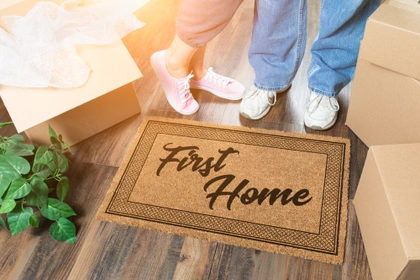How does shared ownership work?
Shared ownership works on a ‘part rent, part mortgage’ basis. You put down a deposit and take out a mortgage to buy your share of the property (which could be around 25-75% of the total value, for example).
The other portion of the property is usually owned by a housing association. You contribute rent to the other party for their share. This is on top of your mortgage payments.
Be aware, ground rent and service charges will also be applicable.
Can you fully own a shared ownership property?
With most shared ownership properties, there is the option to purchase further shares in the future if affordable, until you reach 100% ownership.
Buying further shares is called ‘staircasing’. You would need to check the terms and conditions of your agreement before applying, to find out if there are restrictions surrounding this.
Bear in mind, when you buy more shares, you pay what your home is worth at the time. Valuation fees, legal fees and mortgage fees will apply on each occasion. Stamp duty may also apply, depending on the percentage of the property that you're buying.
How much deposit is needed for shared ownership?
You’ll need to put down a deposit of around 5-10% of your share of the property, not of the full market value. This can make home ownership more achievable and affordable.
For example, if you’re looking to buy a 25% share of a £200,000 house through this scheme, you'd need to take out a mortgage of £50,000 (and pay contribute rent on top each month).
If you put down a 10% deposit on your share of £50,000, this would come to £5,000. (Whereas 10% of the full £200,000 would come to £20,000).
So, you can see from this example, that by taking out a mortgage on 25% of the property’s value, you only have to pay a fraction of the deposit.
Shared ownership eligibility
There are certain criteria that you must meet to be eligible for the shared ownership scheme. For instance, you:
- must be at least 18 years old
- can’t afford to buy a house on the open market
- must be either a first-time buyer, someone who has owned a home before but can’t afford to buy one now, or an existing shared ownership homeowner looking to move house
- must have a total household income of £80,000 or under outside of London, or £90,000 or under in London
- mustn’t have any rent or mortgage arrears
- need a good credit history with no CCJs
Can you get shared ownership with bad credit?
Whether you can get shared ownership with bad credit depends on just how low your credit score is. If you have a CCJ, missed repayments or similar, it’s unlikely you’ll be accepted.
This is because the lender or scheme provider may see you as too high risk. They wouldn’t want to put you into financial difficulty by agreeing to give you a mortgage that you can’t afford to repay.
How long does the shared ownership process take?
The shared ownership process make take a little longer compared to the mainstream mortgage process – but it will vary on a case-by-case basis.
How to apply for shared ownership
There are a couple of extra steps with shared ownership:
- You need to contact a Help to Buy agent in your area to find out if you’re eligible for the scheme
- If you’re accepted and you find a suitable property, you’ll then need to go through a full financial assessment (including a credit check) with the housing association, before applying for the mortgage
Note, you can either apply for a shared ownership mortgage through the housing association, or you can go direct or use a broker if you wish.
Can you rent out a shared ownership property?
No, you can’t rent out a shared ownership property – unless it’s an exceptional circumstance and you have both the scheme’s and the mortgage provider’s permission in writing. Subletting without their permission could put your home at risk.
How does shared ownership work when you sell?
When you sell a shared ownership property, you’ll receive an amount in proportion to the share you own.
Bear in mind that you have to give the housing association the option of finding a buyer before you put the property on the market yourself (this is called ‘right of first refusal’). This could result in the property being sold for less than you would like.
After a certain amount of time, if they still haven’t managed to sell the property, then you can market it yourself (or use an estate agent). Bear in mind, that your options may be limited though, as the buyer will need to meeting the housing provider’s eligibility criteria.
Is shared ownership worth it?
There are advantages and disadvantages to purchasing a shared ownership property, so you should consider these carefully before making a decision.
Advantages
- you need to save less for a deposit
- quicker to get on the property ladder
- you can buy additional shares in the future
- rent may be lower than on the open market (but not always)
- you can sell up at any time and you’ll gain a profiton your share, if the value has increased since you bought it
Disadvantages
- you may not meet the strict eligibility criteria
- you are limited to properties that have been built specifically for this scheme, and you may be restricted as to whether you can make any alterations to your home
- the value may drop - or, if the value increases, it can make it expensive to buy more shares
- full service charges and ground rent are applicable
- subletting isn’t possible unless you own 100% of the property
Mortgages are secured against your property. This means your home may be at risk if you fall behind with your mortgage repayments.
Disclaimer: We make every effort to ensure content is correct when published. Information on this website doesn't constitute financial advice, and we aren't responsible for the content of any external sites.






